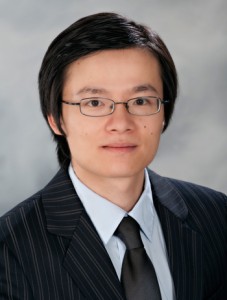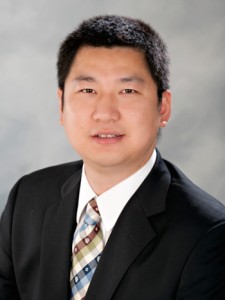Yong Fu and Pan Li: NSF CAREER awards spur ECE research growth
March 1, 2014
In less than two years, assistant professors Yong Fu and Pan Li have turned their National Science Foundation CAREER awards into the basis for thriving research programs within the Bagley College’s electrical and computer engineering department.
Fu’s $400,000 award funds research to develop a distributed decision-making system for a smart grid. Li’s $450,000 award supports research into multi-radio, multi-channel, multi-hop cellular networks. Both researchers earned the five-year early career development grants in 2012, three years after they joined the faculty at Mississippi State.
Distributed decision-making helps maintain the reliability of power grids by allowing utilities to share select information with each other in order to coordinate their power system needs.
Fu said the idea is to develop a way for utilities to balance their power generation and distribution needs using an automated system that can respond, or make decisions, based on the information it is given.
“Power system operations have
different problems, which means finding different solutions,” Fu said. “We have to make our distributed decision-making systems robust so that they can respond to every situation.
Working with two students, Fu has already published two peer-reviewed articles on the topic, with two more accepted for publication. A grant from the Department of Energy has helped him further his smart grid research by funding a renewable energy farm located on the roof of Simrall Hall. Equipped with smart grid technology, the farm allows Bagley College students to learn about the system and collect data for their smart grid-based research.
Li’s cellular network research is geared toward mobile applications such as mobile cloud computing, mobile health systems, mobile video services, and smart cities. It is one of four National Science Foundation projects on wireless network modeling, optimization, and design he currently has underway.
“I believe this type of research is in dire need considering that the current cellular networks are congested already,” Li said. “These new types of cellular networks can support diverse services.”
Li and his team of eight student researchers have published seven journal articles and six conference papers based on this work. He has also developed new advanced topic graduate-level courses related to cloud computing, cognitive radio networks and wireless networks. These classes incorporate in-lab testbeds to show students how the technology is implemented and perform experimental studies.
For more information about this work and other research within the electrical and computer engineering department, visit www.ece.msstate.edu.
By: Susan Lassetter


